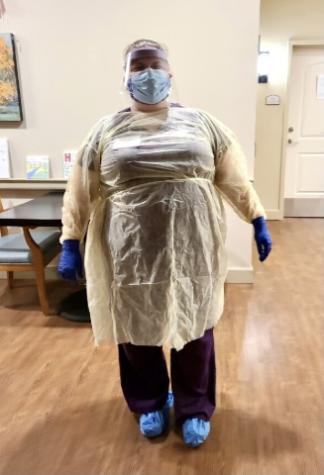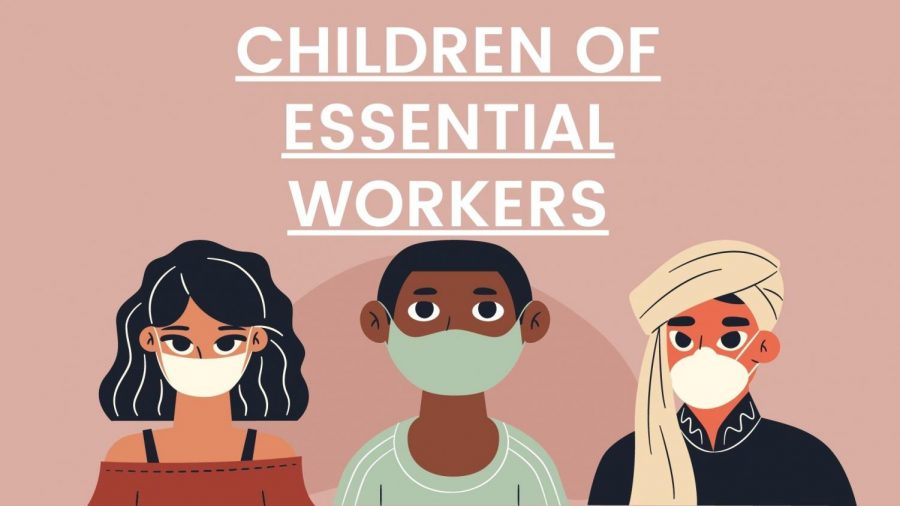Balancing Family, COVID-19, and Safety While Working
COVID-19 affects not just essential workers, but their families too.
Students with essential worker parents have had a very different experience with COVID-19. Image from Canva.
November 10, 2020
When the news started filling to the brim with terrifying COVID related headlines, most people were lucky enough to stay safe and inside, but families with essential workers had no such luxury. While most people were threatened by soul eating boredom, these workers were risking their lives every day. The lives of their loved ones were being risked too.
Defining Essential Worker
In short, an essential worker is an employer/employee whose work is necessary to keep the country functioning. The department of homeland security describes sixteen industries as essential. The list they provided was originally made in March, when quarantine first started, but was updated in August.
A few of the more recognizable essential industries include:
Critical Manufacturing
Defense Industrial Baseline
Emergency Services
Energy
Financial
Food & Agriculture
Government Facilities
There are, of course, many more essential workers that fall into the other categories, but the deeper you dive into essential workers, the more the lines between essential and non-essential blur.
One thing that is less talked about regarding essential workers is how their families are staying safe. Many students at our school have gone through quarantine watching their parent, or potentially parents, go to work every single day.
“First, I didn’t pay it any mind. But as soon as it got worse and worse especially since it hit Florida a lot worse,” sophomore Arthur Rigual explained. “I didn’t want my dad to get sick.”
Rigual is not alone in this experience. When quarantine first started, the potential for months of dangerous exposure was small enough to forget. Today – almost six months after COVID-19 forced everyone into their home – having an essential worker in the home means ever present stress and fear of COVID-19 for everyone in the household.
“I think a lot of people would forget that there’s a certain amount of fear that comes with that because every day is taking a risk,” junior Gracie Gillespie said. “What if it’s the day that my dad happens to pick up COVID?” Gillespie’s father works as a manager of some of the mechanics that specialize in fixing garbage trucks.
One of these students also explained how additional pressure on essential workers has affected his relationship with his father.
“He’s really busy. I work and I hardly get to see him,” Rigual explained. “Sometimes I can only speak to him via FaceTime, messages, or regular call.”
Gillespie had a similar situation, although she says her relationship with her father has not changed over the course of the pandemic.
“They haven’t had as many people working as they would without the pandemic and so he’s been more stressed, has had to work more shifts, and he’s had to have his workers work more shifts, and everybody’s just tired and stressed,” Gillespie said. “So, it hasn’t necessarily affected my relationship, (but) I see how it affects him.”
Staying Safe
Many precautions are being taken to secure the safety of these workers. The risk cannot be eliminated, but there are many steps to take to reduce risks, and some more industry specific precautions.
In the last six months everyone has been told to wash their hands, maintain six feet between themselves and others, and wear a mask- hopefully everyone has. Even then, most people should still be avoiding leaving the house to prevent the spread of the virus. Anyone working in the medical field, though, must go the extra mile in order to stay safe.
“To go into a patient’s home, they want you wearing a surgical mask, and a face shield and then using gloves when touching anything. Social distancing is always a thing as well,” hospice worker and PTA mom Victoria Underhill said. “Now if we’re dealing with any patients that have any sort of respiratory issues, they also want us to have a gown.”
Underhill described her job as providing comfort and helping to alleviate symptoms through in-home care for those with terminal illnesses. Although she does not work in a hospital anymore, and has not for some time, she is still deemed an essential worker.

Mrs. Victoria Underhill prepares for her workday in what she referred to as her PPE, personal protective equipment.
Other workers may take some steps to remain safe of their own violation beyond what is mandated for their job. Work may have more of a focus on keeping their employees safe during working hours, but what happens after workers get home is up to them.
“(My father) takes like a 20-minute shower, he takes his clothes, and he puts them in the washing machine, and he puts his shoes away in the laundromat as well,” Rigual said. “Shoes can also have COVID on them.”
Rigual’s father works in the military, and is also a nurse, working in both the Intensive Care Unit and the Recovery Unit. Since he works in a hospital almost every day, he is especially aware of the risk that he could get his family sick. While the level of caution anyone takes regarding their own safety after they have returned home is up to them, these precautions can help lower the inherent risk of being in and working in a hospital.
Supporting Essential Workers
With all this pressure and danger surrounding being an essential worker, it is important to try to do our part to make life as easy as possible for these workers. Students had some suggestions.
“In lower income families, if people could help out by maybe, providing a meal for them once a week, just something simple,” Gillespie suggested. “Something small that you could do, because I know a lot of essential workers are under a lot of stress right now.”
Although this can help families out in the short term, Underhill suggests a more long-term way of helping.
“I think by doing their part to, to wear their masks, when possible, it’s not always possible for people with certain medical conditions, but to be truthful about those conditions,” Underhill said. “To wash your hands frequently, to be smart, if you’re ill stay at home and to keep your distance.”
The children of essential workers are facing more stress than ever, waiting with everyone else for all of this to come to an end. Until then, everyone continues to do their part to keep everyone as safe as possible.



